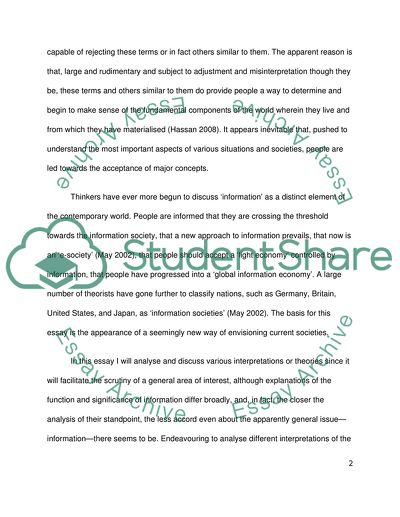Cite this document
(The Discourse on Information Society - Theorising the Nature and Path Essay, n.d.)
The Discourse on Information Society - Theorising the Nature and Path Essay. Retrieved from https://studentshare.org/social-science/1745060-which-thinkers-and-why-in-your-view-offer-the-most-persuasive-account-of-the-information-society-justify-your-argument-by-comparing-a-range-of-thinkers-encountered-on-this-module-and-engaging-with-empirical-evidence
The Discourse on Information Society - Theorising the Nature and Path Essay. Retrieved from https://studentshare.org/social-science/1745060-which-thinkers-and-why-in-your-view-offer-the-most-persuasive-account-of-the-information-society-justify-your-argument-by-comparing-a-range-of-thinkers-encountered-on-this-module-and-engaging-with-empirical-evidence
(The Discourse on Information Society - Theorising the Nature and Path Essay)
The Discourse on Information Society - Theorising the Nature and Path Essay. https://studentshare.org/social-science/1745060-which-thinkers-and-why-in-your-view-offer-the-most-persuasive-account-of-the-information-society-justify-your-argument-by-comparing-a-range-of-thinkers-encountered-on-this-module-and-engaging-with-empirical-evidence.
The Discourse on Information Society - Theorising the Nature and Path Essay. https://studentshare.org/social-science/1745060-which-thinkers-and-why-in-your-view-offer-the-most-persuasive-account-of-the-information-society-justify-your-argument-by-comparing-a-range-of-thinkers-encountered-on-this-module-and-engaging-with-empirical-evidence.
“The Discourse on Information Society - Theorising the Nature and Path Essay”, n.d. https://studentshare.org/social-science/1745060-which-thinkers-and-why-in-your-view-offer-the-most-persuasive-account-of-the-information-society-justify-your-argument-by-comparing-a-range-of-thinkers-encountered-on-this-module-and-engaging-with-empirical-evidence.


